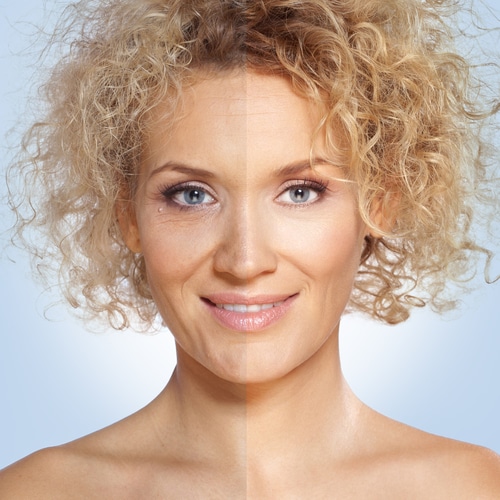
Causes of Aging: The Role of Free Radicals Play
Throughout life were exposed to harmful chemicals in food and water and pollutants in the air, some of which are self-imposed like cigarette smoke. This type of exposure increases the production of free radicals, unpaired electrons that damage cell membranes and the structures inside. This leads to the destruction of cells along with an increased risk of heart disease, cancer and other diseases associated with aging.
What You Can Do About It
You can’t avoid exposure to all damaging chemicals, but you can protect your cells from the damage to some degree by eating more antioxidant-rich fruits and vegetables. Green tea and some spices like turmeric, cloves, cinnamon, cumin, parsley, and basil also have antioxidant properties. Thus far, studies have been less convincing about the protective effects of antioxidant supplements, so get your antioxidants through diet. Exercise helps too. Even though exercise causes free radical formation, it also builds up your body’s defenses against them.
Aging Causes: Inflammation and Glycation
When you eat a processed diet rich in white flour and sugar, two things happen that speed up aging. Blood sugar and insulin levels rise, and insulin resistance becomes a problem. Insulin resistance is linked to chronic, low-grade inflammation, which contributes to how we age. In addition, the extra sugar floating around in your bloodstream attaches to proteins and damages them. This process called glycation is associated with aging, both internally and externally in the form of skin wrinkling. Eating foods cooked to a high temperature creates glycation products called AGEs, or advanced glycation end products. There’s evidence that AGEs can be absorbed into the bloodstream through the intestines, and they contribute to aging.
What You Can Do About It
Cut back on processed foods, white flour, and sugar in your diet. Limit the amount of fried food you eat. Eat more fruits, veggies, and spices like turmeric that keep inflammation in check.
Mitochondria
Mitochondria are often referred to as the powerhouses of cells. That’s because they produce the energy cells need to survive. Researchers have discovered that mitochondria become damaged over time, likely due to free radicals. This makes mitochondria less efficient at doing their job of producing energy. When mitochondria “peter out” it causes degenerative changes throughout the body.
What You Can Do About It
Eating an antioxidant-rich diet helps protect mitochondria from damage, and there’s some evidence that supplementing with alpha-lipoic acid or coenzyme Q-10 may help, but more research is needed to confirm this.
Telomere Shortening
Another theory as to why we age is that telomeres become shorter. Telomeres are cap-like structures on the tips of chromosomes that protect them when they divide. When we’re young, telomeres are long, but they gradually become shorter with age to the point where they’re so short the cell can no longer divide. It’s not clear whether telomere shortening actually contributes to aging or whether it’s simply a marker for the aging process.
What You Can Do About It?
Telomere shortening is linked with stress. One study showed that women who engaged in vigorous exercise for at least 30 minutes a day enjoyed some degree of protection against telomere shortening related to stress. There’s also some evidence that calorie restriction reduces telomere shortening. At present, regular, vigorous exercise and eating a moderately-low calorie diet seems to be the best way to reduce telomere shortening, but there’s still much more to learn about telomeres.
The Bottom Line?
Aging is inevitable, but diet and lifestyle play an important role in how fast it happens. Exercise and a healthy diet definitely have an impact.
References:
Science Daily. “Molecular Link Found Between Insulin Resistance and Inflammation”
J Gerontol A Biol Sci Med Sci. 2005 Aug;60(8):970-5.
Life Extension Magazine. “Short periods of exercise protect telomeres from stress”
Related Articles By Cathe:
Longevity: Is There a Limit to How Long We Can Live?
How Being Physically Fit at 40 Benefits Your Brain at 60
Does Exercise Slow Cellular Aging?
New Evidence Shows that Exercise Slows the Aging Process – and in an
5 Scientifically Proven Reasons Fitness is the Key to Healthy Aging

